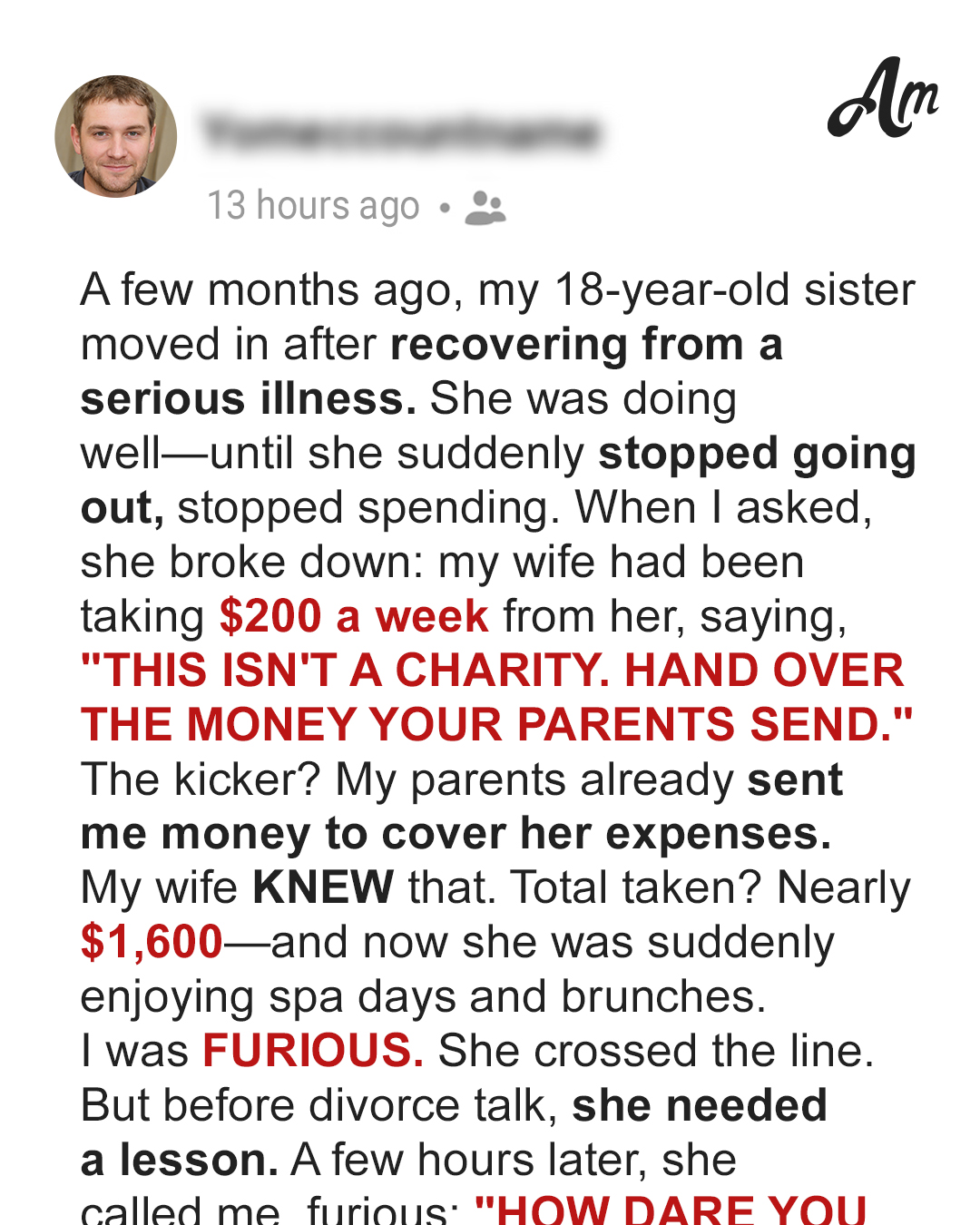
I thought I knew my wife, the woman with whom I intended to spend the rest of my life. But when my younger sister moved in with us, my wife showed me a side I couldn’t bear. She forced me to teach her a lesson she’d never forget.
A few months back, I brought my little sister, Ava, into our home. She was only eighteen, still frail from battling a severe condition that had knocked her out of high school for nearly a year. I thought having her close would be good for her health, until I noticed something strange about her behavior.
The treatments Ava underwent were long and grueling, but she came out on the other side—scarred, sure, but standing. My wife, Dana, seemed on board when I first brought up having my sister live with us.
She smiled, said it was a good idea. Ava’s doctors were in our state, while our parents lived all the way out in Ohio. My sister still lived with them permanently, but I figured the best thing was to let her rest and recover in a familiar place while still having quick access to her doctors.
Ava also had a few friends in the state I lived in, and I thought staying with us would help her slowly ease back into social life. I hoped being with us would give her a sense of comfort and help her heal quicker.
At first, it felt right, and she seemed okay being here. My sister was quiet, but not withdrawn. She eventually started going out for walks, met up with some old friends a couple of times, even smiled at dinner now and then. But after a few weeks, she changed.
Ava stopped going out, wouldn’t even take the dog for a walk—and she adored him. She stopped spending money on her art supplies, which had always been her therapy, or anything for herself. Every time I passed her room, I’d hear nothing.
Just silence. Curtains drawn. Lights off. Sometimes I’d catch her sitting on the edge of her bed, just staring at the floor. She barely left her room, and I was seriously worried that something was wrong with her health and she wasn’t talking about it.
I gave it time. I figured maybe the post-recovery depression was kicking in. But eventually, I couldn’t ignore it anymore.
One morning, while my wife was out, I tapped on my sister’s door.
“Ava? Can we talk for a sec?”
She opened it slowly, her face pale, eyes rimmed red.
“What’s wrong, sis?” I asked, stepping in.
She hesitated. Then her voice cracked as she burst into tears, and the words poured out between gasps of air and sobs.
“She’s been taking my money.”
“Who?” I asked, confused.
She hesitated slightly, then spilled the beans. “It’s Dana,” she whispered.
“What?! My Dana?!” I asked, shocked and confused.
“I tried to tell her I didn’t have much, that I needed it for stuff like—like art supplies or lunch when I meet friends, but she wouldn’t hear it,” Ava explained through sobs.
It was clear she’d been holding this in for a while.
I felt the heat rise in my chest.
“What exactly did she say?”
Ava looked down and quoted Dana almost word for word.
“‘You’re not a child anymore, so stop acting like one. If you’re crashing here, you better start pulling your weight. This isn’t a charity.'”
I clenched my fists.
“She also said: ‘Those little handouts your parents send you? Yeah, you can hand that over. You don’t get to go shopping or hang out while living here rent-free. That’s not how the real world works.'”
My jaw tightened.
This was INSANE! I was stunned!
“Why didn’t you tell me sooner?” I asked Ava.
“I didn’t want to cause problems between you two. I thought maybe she needed the money or something…”
What made it worse was that my parents sent a small allowance to me to help cover Ava’s food and expenses. It’s factored into our household budget, and my wife knew that. But she still went behind my back and made my sister feel like a burden!
Dana had never been cruel—not like this. However, lately, I noticed things: new bags, brunches with her friends almost every other weekend, spa receipts for manicures and pedicures popping up in our shared inbox.
That wasn’t like her. We weren’t broke, but we weren’t exactly rolling in cash either. I put two and two together and figured that these extra things were coming out of the money she was stealing from Ava.
When I asked my sister how much Dana had taken, she told me she’d given her almost $1,600. My wife had been collecting $200 each week from my sister while she tried to recover!
I vowed to make this right to Ava, gave her a hug, left her room, and sat in the kitchen for a long time, thinking. I was LIVID! So I checked our accounts. Sure enough, the math didn’t lie! The extra $200 a week that was supposed to be for Ava—from our parents, sent directly to me—wasn’t showing up in the usual withdrawal pattern.
Instead, there were new debit charges from Dana’s personal card, small withdrawals every Friday from her Venmo account. She had been collecting Ava’s money—and spending it!
Honestly? A part of me wanted to end the marriage right then and there! What she had done felt so heartless, so inhuman—taking advantage of someone that vulnerable. But instead of exploding, I decided to teach her a little lesson first.
I didn’t say anything to Dana right away. Instead, I made a silent decision. I wanted her to feel what Ava felt: unsupported, alone, and blindsided. So I logged back into our accounts and canceled every single thing I’d been paying for that was solely for Dana.
I canceled her phone bill, her Hulu, Spotify, internet subscription, the auto-pay for her yoga studio, and her skincare and beauty subscriptions and services. All gone!
Within a few hours, my phone was blowing up! First, a bunch of missed calls. Then a string of frantic texts.
When I eventually decided to answer her calls, she was angry!
“What the hell is going on?! My phone’s off! My data isn’t working and I can’t access anything!”
“My yoga app says my membership is canceled?? Did you mess with the accounts?!”
I waited until she was done.
“Mark! What is going on? I couldn’t even use my card at brunch!”
“Weird,” I said, dryly. “I thought you had enough rent money from Ava to cover all that.”
Silence on the call.
“…Wait… how do you—what are you talking about?”
“I know, Dana. You’ve been taking money from my sister. Behind my back,” I disclosed.
“Well—yeah, because she’s living here! I don’t see a dime from that arrangement!” she said, trying to justify her cruel actions.
I finally lost it!
“Are you serious right now? She’s my sister, not a tenant! She’s a sick teenager trying to recover, and I’m already getting money from our parents to help support her! Money you knew about. And I also planned financially for her stay too!”
When she tried talking, I cut her off, shouting, “How dare you take her personal money and act like she owes you rent?!”
Dana’s voice turned defensive.
“Okay, maybe I didn’t handle it right, but I just thought, why should we be paying for everything? I don’t get to go to brunch or treat myself unless I save up forever! Meanwhile, she’s out here sketching on thirty-dollar notebooks!”
“You think this is about brunch?” I snapped. “You could’ve asked me! We’ve always talked about budgeting! Instead, you bullied my sister, who just finished treatment into giving you cash to fund your nails and yoga! That’s insane, Dana!”
She started crying and apologizing.
“I’m sorry, I didn’t mean it that way… I just felt like everything is always about your family. You’re always bending over backward for them, and I get left behind.”
I let out a bitter laugh.
“You didn’t feel left behind! You just wanted more and didn’t care who you hurt to get it! You could’ve come to me! But you went after Ava because she was the easiest to manipulate!”
There was silence. Heavy. Awkward. Ugly.
I knew then, I really knew, that things between us would never be the same.
In the days that followed, Dana tried to smooth things over. She apologized, said she wanted to make it right. She offered to return the money to Ava—even baked a cake one night, like that could undo the months of guilt and shame she’d piled on my sister.
But for me, the damage was irreversible.
I started seeing Dana differently. She didn’t just cross a line; she exposed who she really was. That moment had unmasked something I hadn’t seen before, a selfishness I couldn’t forget.
We had long talks. Tearful ones. She admitted she was unhappy and felt unappreciated. I admitted I hadn’t always paid attention to her emotional needs. But it didn’t change what she’d done. The coldness of it. The manipulation.
Eventually, we separated as I made the hard decision to end the marriage. Quietly. No big blowup. Just an honest acknowledgment that trust had been broken in a way that couldn’t be repaired.
It wasn’t just this incident, it was that it revealed a deeper issue I couldn’t ignore anymore.
One evening, a few weeks later, I sat next to Ava on the porch swing.
“I’m sorry,” I said.
She looked at me, puzzled.
“For what?”
“For not noticing sooner. For not protecting you better.”
She reached over and squeezed my hand.
“You did, though. You listened. You believed me. That’s more than most people would’ve done.”
We watched the sunset in silence for a while. Then she said something that stuck with me.
“People show you who they are when they think no one’s watching.”
She was right.
And that’s why I don’t regret what came next—not the confrontation, not the account cuts, not even the separation. Because in the end, I didn’t lose a marriage. I just saw the truth in time.
In the following story, another woman named Ava got a house as a wedding gift from her mother for her and her husband, Jacob, a house. Sadly, Ava’s in-laws moved in with her and turned her into their maid. When her mother discovered the truth, she put her foot down!
This work is inspired by real events and people, but it has been fictionalized for creative purposes. Names, characters, and details have been changed to protect privacy and enhance the narrative. Any resemblance to actual persons, living or dead, or actual events is purely coincidental and not intended by the author.
The author and publisher make no claims to the accuracy of events or the portrayal of characters and are not liable for any misinterpretation. This story is provided “as is,” and any opinions expressed are those of the characters and do not reflect the views of the author or publisher.





